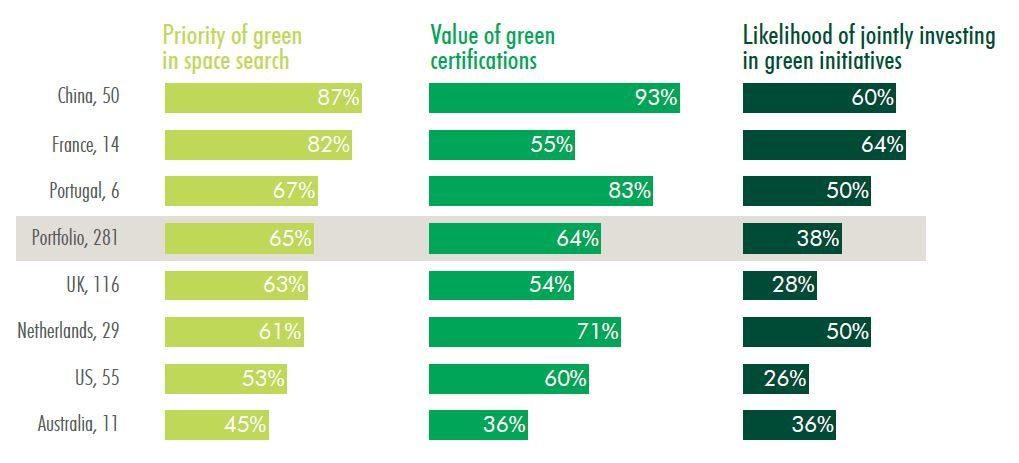Adapting to the Corporate Responsibility-Conscious Occupier

Understanding occupier satisfaction is vital to the success of the property industry. It enables continuous improvement in relationships between landlords and tenants, and encourages best practice property management processes by managing agents.
What drives occupier satisfaction?
The results are in… according to CBRE’s latest annual Global Premier Properties Occupier Survey, which polls more than 500 occupiers across 9 countries:
- 80% of occupiers want social or charity events to be staged in and around their buildings, with 38% desiring three or more events per year; occupiers see social and charity events as a way to make multi-let offices more engaging and socially interesting places to work;
- Combining effective and responsive facilities management with a strong sense of ‘place’ and ‘community’ can help building owners differentiate their assets, while also driving occupier retention;
- Security is now the number one factor in determining occupier satisfaction. It is important that we remain on our guard; constantly reviewing and enhancing our security operations to provide protection while letting our occupiers’ daily business operations proceed unhindered; and
- Sustainability is rising up the agenda. The biggest emphasis on green attributes in the search for space came from occupiers in China, with those from ‘Western’ markets such as the UK and US lagging behind (though France, it should be noted, also placed higher emphasis on green expectations).
The millennial mind-set
By 2020, millennials born between 1980 and 2000 will make up half of the global workforce.
With such a large voice, millennials’ decisions about where they work, how they work and whom they work for will have lasting consequences for the global economy and for real estate. Employers looking to attract and retain the best and the brightest in the “war for talent” will need to know what motivates millennials and how their needs may differ from those of previous generations.
According to CBRE’s latest research, millennials are placing significant value on sustainability-, and corporate responsibility- related factors in workplace selection. 34% rate environmental credentials as ‘very’ or ‘extremely’ important and 36% of millennials want wellness and rest facilities in their workspace.
36% of millennials want wellness and rest facilities in their workspace
A lack of wellness facilities is potentially of great concern, and is an issue that companies are starting to take seriously. Previous research by CBRE found that 74% of European employers have a wellness program in place. This is an important issue for millennials in the workplace, since their generation is characterized by a relatively strong commitment to health and well-being.
Millennial implications on real estate
To compete for the best and brightest of the rising generation, companies are adapting their location strategies, their workstyle and their workplace design.
- Leadership from the top – The trend toward activity-based working and open-plan, mixed-environment offices is changing the way many of us work. Change management is always crucial when adopting new ways of working, and leadership from the top is needed. The millennial workforce will lead the charge if new office environments are implemented sensitively.
- A blend of work and leisure – While millennials may have ushered in a blur of the boundaries between work and leisure, they don’t want to be “always on,” and expect opportunities for privacy and relaxation in the workplace.
- Wellness matters – Millennials seem to care more about their general health and well-being than other generations, although awareness is rising across all sections of society. As the debate about sitting being “the new smoking” rages on, companies need to emphasise wellness throughout the workplace.
- Location, location, location – While major cities are attractive places to live and work, they are also expensive—which makes it hard for millennials early in their career to manage. Some employers that especially need young talent—particularly in the tech sector—are adapting their location strategies to target concentrations of millennials outside of traditional major cities. With a lower cost of living and more-affordable housing market, these towns and smaller cities also typically offer lower operating costs for companies.
So, what does this all mean?
For landlords? This means investing in real estate assets with green credentials, ensuring that your portfolio is as attractive as possible to current and potential occupiers, ultimately driving up demand for your buildings.
For occupiers? This means selecting your office space with sustainability and wellness in mind, and continually working to respond to and exceed employee expectations – by doing so improve staff retention and attraction.
For CBRE? Not only does this mean providing sound sustainability and wellness advice to bring together both parties, but it is key that we adopt sustainability and wellness principles in our day-to-day way of working.
All signs point to a more sustainability- and corporate responsibility-conscious occupier market. If this trend is to play out, we are likely to see significant change in the real estate industry.

